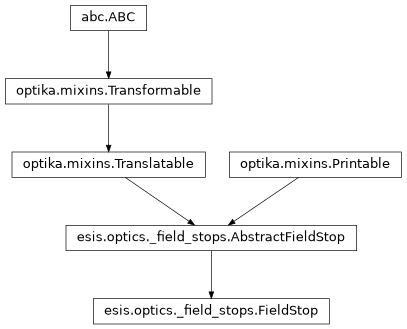FieldStop#
- class esis.optics.FieldStop(num_folds: int = 0, radius_clear: astropy.units.quantity.Quantity | named_arrays._scalars.scalars.AbstractScalar = <Quantity 0. mm>, radius_mechanical: astropy.units.quantity.Quantity | named_arrays._scalars.scalars.AbstractScalar = <Quantity 0. mm>, translation: astropy.units.quantity.Quantity | named_arrays._vectors.cartesian.vectors_cartesian_3d.AbstractCartesian3dVectorArray = <Quantity 0. mm>)#
Bases:
AbstractFieldStopAttributes
number of sides of the field stop's aperture
the coordinate transformation between the global coordinate system and this object's local coordinate system
Methods
__init__([num_folds, radius_clear, ...])to_string([prefix])Public-facing version of the
__repr__method that allows for defining a prefix string, which can be used to calculate how much whitespace to add to the beginning of each line of the result.Inheritance Diagram

- Parameters:
num_folds (int)
radius_clear (Quantity | AbstractScalar)
radius_mechanical (Quantity | AbstractScalar)
translation (Quantity | AbstractCartesian3dVectorArray)
- to_string(prefix=None)#
Public-facing version of the
__repr__method that allows for defining a prefix string, which can be used to calculate how much whitespace to add to the beginning of each line of the result.
- radius_clear: Quantity | AbstractScalar = <Quantity 0. mm>#
- radius_mechanical: Quantity | AbstractScalar = <Quantity 0. mm>#
- property transformation: AbstractTransformation#
the coordinate transformation between the global coordinate system and this object’s local coordinate system
- translation: Quantity | AbstractCartesian3dVectorArray = <Quantity 0. mm>#

